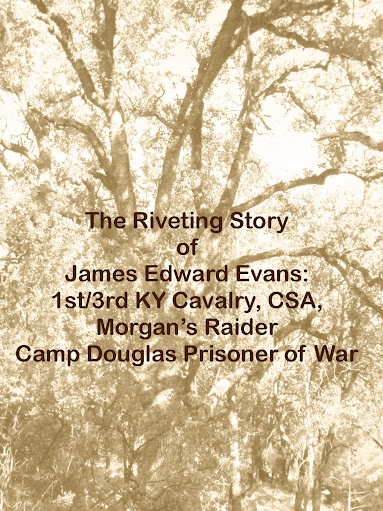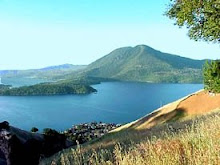The following story was written by J. F. Bowles of Dexter, OH and printed in the Democrat of Pomeroy. OH on Dec. 1, 1927
"At Harrisonville: Stirring Scene of War Times in Scipio Vividly Portrayed and Fine Tribute Paid to her Worthy Citizens.
Harrisonville, named in honor of the illustrious Tippecanoe in the early forties and the gem of Meigs County's western hills, is charmingly located in a vast natural amphitheater, all but surrounded by towering hills of scenic beauty, where rise the dreamy, murmuring waters of Little Leading that bears them away in their course to the Ohio and onward to the sea.
This peaceful hamlet was once the scene of some most thrilling unwritten history, and it has produced some distinguished sons whose names are household words in all this section, among whom were Col. E. P. Brooks, Doctors Selin and Howard Day, 'Tip' Dye, N. A. Race and Dr. John M. David, all of whom richly contributed to the name of their native town.
In this connection we would not forget her brave sons who were gallantly fighting at Missionary Ridge, Chickamauga, Vicksburg, Fair Oaks, Cold Harbor, Spotsylvania, Anthietam and on the many other battlefields of the south while all was peace and serenity at home. But this peace was soon to be broken.
Sixty-four years ago, on a July morning the sun shone brilliantly in a cloudless sky, presaging a perfect day. The countryside around Harrisonville presented a wealth of corn that shimmered and glistened in the sunlight, orchards bending with luscious apples, meadows waving in the breezes and fields of golden grain ready for the sickle. Little did her people dream that the union and confederate armies would meet there on that day in the shock of conflict and blood would be shed by raider, women commanded to serve meals by armed, booted and spurred soldiers and those beautiful fields of grain laid waste to become horse feed for the opposing armies.
As the sun was mounting high in the heavens, a cloud of dust was seen to the eastward, the resounding hoof beats of horses were heard and a long column of gray coated cavalrymen came in sight. It was Morgan's Raiders. The sight of them struck terror to the hearts of Harrisonville people. Soon the town and the great bottoms below it were swarming with rebels. The militia that had assembled there scattered and fled in all directions. Elza and Prsly Turner were late in arriving on their horses with guns on their shoulders. The rebels took them prisoners, confiscated their horses and bent their guns around a tree. The Rev. Thomas A. Welch, later a member of the Ohio Senate, lost both his horses but saved himself. S.B Chalfam was coming to town on a spirited horse which he saved in flight and hid him in the woods. Frank White and Selim Tope were running away when the rebels commanded them to halt. They disregarded the command when Tope was brought down by a shot in the heel from which he never recovered. After plundering the stores, feeding their horses by leaping right over fences into grain fields and satisfying their appetites, the rebels mounted their horses and disappeared over the hill, going towards Rutland.
Three raiders lingered to continue plundering Maggoon's Store. One sat on his horse and held the other's two horses while his comrades entered the store. The guard outside looked up the street and saw Hobson's men coming and he shouted to the troopers inside, 'They are coming, boys'. The two men ran out of the store, mounted and wheeled their horses and faced their pursuers. The Union men had seen the rebels at the instant the guards gave the alarm and the order to charge was given. Instantly every man dropped his bridle reins, drew his horse forward to the attack. Down the street they came with clanging sabers, every man leaning low upon his horse's neck to escape the rebel bullets and every man holding a big gun in each hand, pointing forward. The rebels saw that it was either die or give up and they placed their hats on the points of their sabers and held them high above their heads in token of surrender. Not a shot was fired. One of the raiders, a boy yet in his teens, said, 'Well I don't care, I am tired of this anyhow. Now I'll get to go home to Mother. '
There is little doubt that Hobson's men thought Morgan's Army was in town and that it was the beginning of a real battle. Had the Union men kept on down the road there would have been a finish fight and Harrisonville would have received a still greater baptism of war. But these men were covered with dust, worn out by the long pursuit and too hungry and tired to fight. The town women had apples and flour left and the soldiers lingered long to devour great numbers of delicious apple pies baked by these patriotic ladies.
Right here let us pause to thank a patriotic lady for this thrilling and vivid information - Mary Farley Folden of Dexter. She was then a child of 14 summers. She carried her trade to Harrisonville that morning and when the fireworks began she stood her ground and saw the whole works. She comes from good old revolutionary stock and is Irish and the Irish love a fight. How her face lighted up and her eyes flashed when she exclaimed, 'O, I can just see that gallant charge of the Union Men now. ' She further says that Gen. Morgan was pointed out to her, riding a cream white horse. If this was the division that escaped at the battle of Portland and retreated westward, this was a mistake, as Gen. Basil Duke, as both were subordinates in command.
Aunt Mary's sides shake with laughter when she tells how the venerable Martin Dye ran that day so fast that his rump struck a gate post and he thought he was shot and ran straight into Dr. Day's office. Dye had no gun and if he had had one he could not have stopped the rebel army. Thomas P. Foggan, underground railroad conductor, for whom a Lewisburg Va. paper offered a reward of $2000, dead or alive, defied Morgan's army at Salem Center with a squirrel rifle, and when the rebels began to bore holes in the board fence in front of him, he concluded it was the better part of valor to make his legs carry him out of the danger zone.
Please do not get the idea that Uncle Martin Dye was a coward for he was made out of sterner stuff, was a leader in the days of pioneer life, a Democrat of the Andrew Jackson type who gave to the world eight stalwart sons of whom he had every reason to be proud, and while running from rebels in the north he had sons in the Union Army chasing rebels down south.
You will pardon the writer for digressing far enough from the incidents of those turbulent times to recall that he found a safe counselor and guide through life in one of the beauty spots of fair Scipio that proudly bears the name of one of the great commanders of the Roman legions. None knew the sons of Martin Dye the pioneer better than this lady who never refers to them except in terms of highest admiration. Seldon gave the land and founded Dyesville, Dr. Tom built up Great Bend, 'Tippecanoe' stood on the firing line when the nation was in peril, sold at least a million dollars worth of goods honorably after returning and at 90 lives to back the nation with his money, while David, Zach, Martin, John and Andrew founded the progressive Dye settlement with its wealth of blue grass, palatial homes, blooded stock, and generous hospitality down to the youngest generations.
The ancestral home of Mrs. Bowles who keeps a cozy corner in her heart for the splendid people of Scipio, joins that of Andrew Dye who wore the flaming red necktie that distinguished Custer's dashing boys, one of the best neighbors that ever lived and one of the truest, bravest soldiers that ever wielded a saber in defense of his country.
Morgan's raid is now only a memory. Its wounds are healed and we would be fair to a fallen foe and a lost cause. His troopers not only confiscated property as did northern soldiers but they stole things they did not need and did it with the frenzy of a small boy plundering an orchard.
Douglas's store in Wilkesville suffered the heaviest of any in this section. Troopers could be seen riding away, some with three hats on their heads, some carrying bolts of calico, one had two bird cages tied to the pommel of his saddle and one had a necklace of skates hung around his neck in July.
Yet one would not paint Morgan too black in comparison with Sheridan in the valley of Shenandoah or Sherman on his march to the sea, for some of our boys who served with these commanders laugh in their sleeves at the stories of 'outrages' committed by Morgan's Raiders in Ohio."
Subscribe to:
Post Comments (Atom)





No comments:
Post a Comment